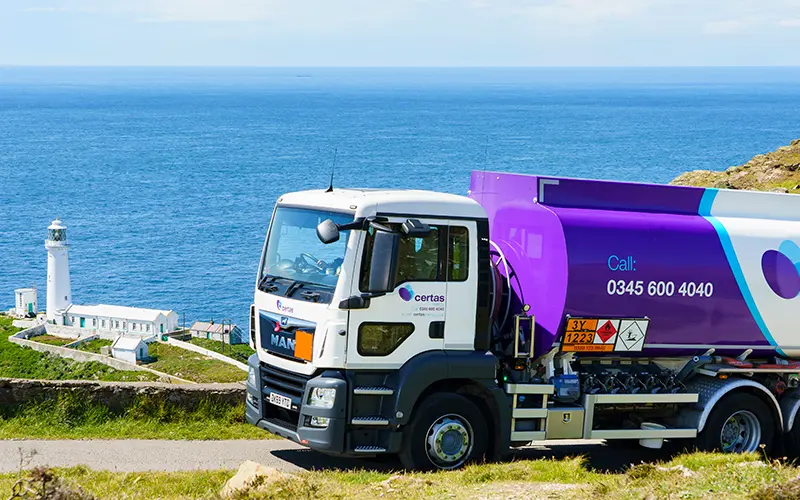Being on the road all year round, hauliers will be the first to testify how bitterly cold the UK weather can get. But there’s more to winter preparation than warm clothing and a hot thermos. The cold weather can have serious impacts on unprepared vehicles, causing fuel issues that could stop your fleet from heading out on the roads at all.
Taking precautionary measures can ensure engines run at peak performance in even the coldest of conditions. Read on to find out how the fuel storage, additives and alternative fuels can help you to achieve the best fuel flow for your fleet this winter.
Best practice bulk fuel storage for winter
Tank maintenance and servicing play an important part in keeping fuel in tip top condition and fleets moving through winter. Water, sludge and sediment can build up over time in a tank and, during winter, these contaminants can freeze and cause blockages and wear within fuel systems. That’s why it’s important to check tanks for any signs of sludge before temperatures drop. Ideally, businesses should check bulk fuel tanks for water weekly or monthly, depending on the outdoor temperature, to prevent microbial build up and costly corrosion.
The growing popularity of sustainable energy sources such as biofuel is increasing the volume of fatty acid methyl esters (FAME) in total fuel mixes, and this is expected to grow from 7% to 12.4% by 2032. However, FAME has strong hygroscopic properties, meaning it is highly effective at absorbing water. This can result in year-round issues such as poor fuel performance, higher fuel consumption and greater risk of ‘diesel bug’ infestation, but is particularly problematic during the winter months when the water content can lead to frequent waxing and precipitation problems. However, FAME is an excellent biofuel for meeting the UK’s Renewable Transport Fuel Obligation (RTFO), and there are ways to overcome the issues it presents.
Poor tank maintenance can cause disruption no matter what time of year it is. Be sure to check your tank regularly for any signs of wear and tear like cracks, deformations or weather erosion, as these can cause costly leaks and spillages. If anything seems amiss, call an OFTEC-registered engineer to perform a full inspection. At Certas Energy, all our engineers are OFTEC-registered and qualified to support with every aspect of tank installation, servicing and maintenance, including fuel polishing and tank cleaning. Find out more by downloading our tanks brochure here.
Wax on, wax off
When the cold weather sets in, fuel can be at risk of forming wax crystals that can clog up fuel lines, or even prevent vehicles from starting at all. Anti-Wax is an additive that is formulated to improve the cold flow and handling properties of diesel and gas oil. Used as a preventative measure before waxing occurs, it is typically added at the rate of 1 litre of additive to 1,000 litres of fuel, and works with fuel that has the maximum allowable FAME content.
Prevention is the best cure when it comes to keeping your fuel healthy in winter. To improve the cold flow and handling properties of your fuel, Anti-Wax is best added to a bulk supply in advance, when the weather forecast predicts temperatures below -5°C. It should be dosed at environmental temperatures above 5°C
Other additives also play an important role in enhancing overall fuel quality: Anti-bug Kill and Anti-bug Protect, for example, can tackle and prevent microbiological infestations in fuel. Diesel Power Restorer is also specially formulated to clean out engine deposits. Such additives can help to prevent disruption, protect your fuel supply and vehicles and increase performance efficiencies, while also reducing maintenance requirements. Remember: using additives will not affect manufacturer warranties, as they do not change the specification of the fuel. For added peace of mind, it’s best to order additives from a trusted supplier who can verify their product. Additives supplied by Certas Energy do not affect fuel specification and can help keep your fleet moving smoothly – even in harsh winter conditions.
Busting the cold flow myths around alternative fuels
While most people are aware that one of the key benefits of using alternative fuels is a reduction in emissions, few know of the improved cold start properties offered by certain alternatives such as gas-to-liquid (GTL) fuel.
Although paraffinic fuels are widely believed to offer poor cold flow properties due to them containing high levels of normal paraffins (n-paraffins), this is not always the case. GTL Fuel is a drop-in, cleaner-burning diesel alternative that consists almost entirely of straight chain n-paraffins and branched iso-paraffins. As well as reducing emissions of harmful pollutants like nitrogen oxide (NOx) and particulate matter (PM), GTL fuel meets the specifications for winter grade fuels in Europe due to its unique production process, which ensure that iso-paraffins predominate over n-paraffins for good cold flow.
Furthermore, as the iso-paraffins in GTL Fuel have limited and short side chains, the fuel has both a high cetane number and good cold flow. Combined with a cold filter plugging point of below -20°C (when untreated with a cold flow additive), GTL Fuel supports better starting performance for fleets in cold conditions, helping to keep them running all year round.
When the temperature drops, it pays to be prepared. And, with a fleet of 900 tankers ourselves, we understand the challenges that winter can bring to the haulage sector. That’s why Certas Energy is perfectly placed as your fuelling partner, providing everything you need – from AdBlue® and additives to storage and telematics – to keep your fleet on the road.
Talk to one of our experts today to discover how Certas Energy can help you keep your fleet moving this winter, the right way.
Call 0345 600 4040 to speak to the team
Request a call back to discuss your needs
Discover more about fuelling your fleet
TAKE CONTROL OF YOUR FLEETS FUEL
Ready to start fuelling your business' success?
Steamline your fleet operations, control costs, and experience the benefits of Certas Energy Fuel Cards. Get in touch to start saving today.




